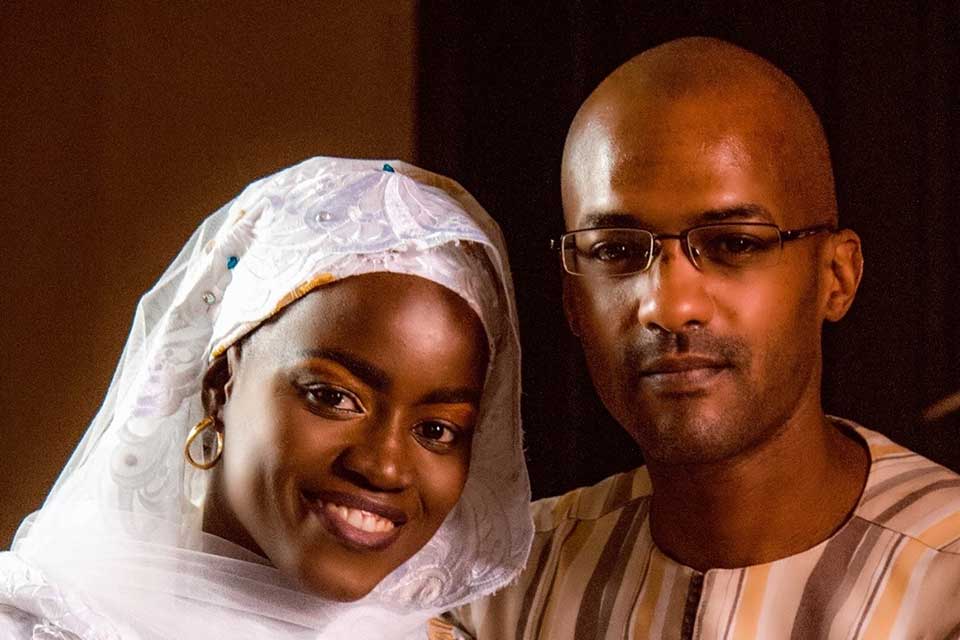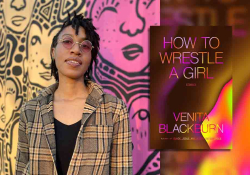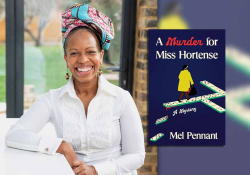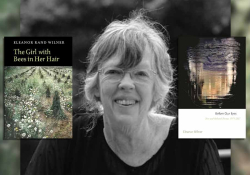Love Is the Only Story: A Conversation with Mame Bougouma Diene and Woppa Diallo

“A Soul of Small Places,” by Mame Bougouma Diene and Woppa Diallo, made history recently when it emerged as the first jointly conceived story shortlisted for the Caine Prize for African Writing since the first award was made in 2000 to Leila Aboulela. Diene is a Franco–Senegalese American humanitarian based in Pretoria, the francophone spokesperson for the African Speculative Fiction Society, the French-language editor for Omenana Magazine, and a regular columnist at Strange Horizons. He was nominated for several Nommo Awards, and his debut collection, Dark Moons Rising on a Starless Night, was nominated for the 2019 Splatterpunk Award.
Diallo is a lawyer with a specialization in human rights, humanitarian action, and peace promotion. She is a feminist activist committed to social change and the realization of women’s rights. Woppa founded L’Association pour le Maintien des Filles à l’Ecole (AMFE) at fifteen in Matam, Senegal, to ensure fair access to education for girls, eradicate gender-based stereotypes, promote sexual and reproductive health, and promote the continued socialization of girl-victims of gender-based violence. In this conversation, Darlington Chibueze Anuonye chats with Diene and Diallo about the inspiration and aspiration of their story.
Darlington: Hi, Mame and Woppa. Congratulations on your Caine Prize shortlist recognition. Where were you when you heard about the nomination? And how does this recognition make you feel?
Mame Bougouma: It was Woppa who saw the email first. I was at work and she called me to check my inbox. How does it feel? I don’t know. Incredibly gratifying, a little daunting, and really, really exciting.
Darlington: Woppa, you’re a bearer of good news.
Woppa: Thank you, Darlington. I was at home when I saw the email first, but I wasn’t quite sure I understood it because it was in English, so I used DeepL to translate before sending Mame the news. I am super happy, really excited about it. And really proud of him.
Darlington: It’s the first time the Caine Prize is shortlisting a jointly authored story. Mame, how would you describe the experience of collaborating with Woppa on the project?
Mame Bougouma: The collaboration was not one of co-authoring in the traditional sense where two minds get together to write a story, discuss the plot, and split roles, etc. Woppa did not write the story. In this instance, Woppa and I were visiting La Maison Rose in Guedyawaye outside Dakar; it’s a shelter for homeless teenage girls, usually kicked out by their parents over an unwanted pregnancy or sexual abuse. A really great place. Woppa has worked tirelessly since she was fifteen to eradicate gender-based violence in the parts of Senegal where she is from, and when she spoke about her cause, her passion, her emotion, the palpable reality of her descriptions really moved me, and I knew I had to tell the story of the struggle. She’s the hero of the story because she is one in real life.
So, we talked a lot when I told her I was writing this story. She told me about the stone statue in her village. She introduced me to the term Soukounio, and a couple of the descriptions in the story are straight from her lips to the paper. This story wouldn’t exist if Woppa didn’t, and I felt that she deserved the accolade as co-author, and I was hoping that if the story got somewhere, it would help draw attention to the plight of young Senegalese women in remote areas that donors and NGOs and international organizations don’t work in for a variety of reasons. To me, it was her reaction when I read her the story that meant everything to me. If it had never been published, I still would have been happy. We discussed this with the Caine Prize before the nomination. It’s great that they chanced on the story, and I appreciate that they took the time to understand the process.
Woppa: Mame is right; I did not write the story. I only shared some of my experiences and answered a couple of his questions early on. I am truly moved that it inspired him to write such a beautiful story and that it has gotten this far.
Darlington: Woppa, do you think the abuse of women in the story says anything about Senegalese society today? And shouldn’t we be worried that the raped girls in Woppa’s community were compelled to marry their abusers?
Woppa: Senegalese society is evolving. There’s been a lot of advocacy and demonstrations by survivors, activists, and civil society. These kinds of extreme cases still happen in remote rural areas, but things are changing gradually and in the right direction.
Mame Bougouma: Let me add that women who are abused are treated poorly everywhere. The police won’t listen; they get blamed for their abuse. Woppa happens to be Senegalese and from Matam, which has its problems, but with a little tweaking this story could have been written practically anywhere, and that’s the real tragedy.
Women who are abused are treated poorly everywhere. The police won’t listen; they get blamed for their abuse.
Darlington: I find that even when Woppa wants to talk about her experience, she just does not remember much. Is this forgetfulness a deliberate ploy to repress her trauma?
Mame Bougouma: As far as the story goes, silence serves two purposes. Yes, it’s a reflection of real-life trauma, but in relation to the narrative, it’s also a trick to keep the suspense going.
Woppa: I think each survivor has their own way of coping. Some would rather repress their memories. Many survivors tell you they want to forget or would rather not be reminded, in order to function. Some choose to tackle it face on. It’s different for each and every one.
Darlington: It took the killing of the rapists to keep their likes away for two years and ensure the safety of girls in her community. Isn’t it just stark that only death proves capable of temporarily redeeming the girls from the clutches of the rapists?
Mame Bougouma: That’s the worst of it. The rapes stopped because they patrolled the countryside because of the murders, not because of the sexual violence. That’s what hurts most; the peace was a by-product of fear of something else, but not the real issue.
Darlington: I know that the short story is such a limited space to say many things, so let me ask you, Woppa: What do you think about the character Woppa?
Woppa: When you’re a survivor, you’re locked in a room with two doors, one door leads to further ostracization, while through the other door we assert ourselves more. Woppa chose the second door.
Darlington: The herdsmen, who are the rapists, were just callous. Their actions had no explanation. And of course I know that nothing justifies rape. But I am wondering: is there more to it? Is there a historical element to all of this?
Woppa: Ndiftoungu. It doesn’t happen anymore, but kidnapping a bride was an accepted marital practice in our communities. Now it’s reenacted ceremoniously, so there is probably something there.
Darlington: Mame, how did you write about such a dark history with so much light?
Mame Bougouma: Contrast is inevitable. It’s only dark because there is light. So, it’s only natural for it to shine through. I wanted to carry that lingering sense of hope even as the story gets darker and darker, because that’s where the true struggle shines. It’s twofold here obviously because as much as she wants to keep fighting the injustice, she is also fighting against what allows her to fight in the first place, so she shines twice as bright even as she’s torn apart.
I wanted to carry that lingering sense of hope even as the story gets darker and darker, because that’s where the true struggle shines.
Darlington: The world of the story is one in which spirits and human beings coexist. How did you come to this kind of imagination?
Mame Bougouma: It’s a very African cosmology. In Africa there is no difference between both worlds, they constantly interact and enrich each other, and that’s what is reflected here. Of course, it’s also a dark fantasy/horror story, so there would be a supernatural element to it. Most of my horror stories are real world with a supernatural element to them. I find it infinitely more interesting to address real-world issues and sublimate them rather than create a whole new world. Maybe I’m just lazy, but when it comes to horror, I find that plenty of things are awful enough in real life; the work then becomes translating them in a universal manner, with an otherworldly element that allows for different levels of resolution.
Darlington: It’s so sad that everything Woppa suffered was caused by men who prey on women and girls, rape, maim, and ultimately destroy them. I am melancholically drawn to the story of the woman who chose to be turned into a stone after she was raped by her husband’s family. The manner in which she narrated her experience to the water spirit broke my heart: “I can’t go back there, but I can’t leave this place either. This is my home. Turn me into stone, right here over the waters where I belong, so they remember me, and every young girl has a place to hide.” Her decision to create agency and refuge for women and girls in her community from her own experience is simply powerful.
Mame Bougouma: Thank you for appreciating the wording. Woppa told me about the statue, and I added that spin to it. I thought it made a beautiful sacrifice and the kind of thing that would carry weight and change a person. I also wanted to impress the fact that impending doom is in the character’s psyche from an early age, an awareness that ages you even if you don’t realize, even if you don’t understand what is at stake, how your own life is at stake, and how somehow a part of it becomes a part of you.
Woppa: Advocating for women is not easy. We started young with friends in my high school after one of our gang became pregnant over the summer and dropped out. We started lobbying the school principal and the village chief to find ways to help other girls who couldn’t attend classes and started educating ourselves and people in our community about underage marriage, teenage pregnancy, and sexual reproductive health. That was fifteen years ago. We still work on it every day. Things are changing, but they change slowly in rural areas—girls are still caught in very patriarchal cycles, but we are changing things.
Darlington: I’m fascinated by the idea of names and their relationship to identity, just as I am drawn to the belief that birth and death constitute the regenerative cycle of life; that when we depart this earth, we live in other forms, and that we also resurrect in new bodies. So, when I read the following declaration by Woppa, in her moment of sorrow, it lifted my soul: “My lips had touched the stone. The choir of whispers exploded in my head. Three distinct voices. Three distinct names. Names that were gods. Names that were dead. Names that would never die. That could never die, because they were names of women, and we are resurrection and rebirth.” And this was why even after her death, Woppa lived and remained in contact with Awa, keeping her company, reassuring her. What inspired the idea of resurrection and rebirth in the story?
Mame Bougouma: Not exactly. The names are the names of the three major pre-Islamic deities worshipped in Mecca. Salman Rushdie mentions them, too, in The Satanic Verses: Al-Lat, Manat, and Al-Uzza. I wanted to tie her awakening to a deeper past, one that we do not know or misunderstand, but old gods are never washed away, they change and they remain and they influence us. And of course, this is a story about women first and foremost, so I wanted to connect with female deities and suggest that even in our patriarchal present, there might be something that we’re missing, something deeper. Perhaps.
Not exactly either, or maybe about Awa, if so I didn’t do it consciously. Actually, it’s much more sinister than that; she is not staying with her or keeping her company, she is passing on the curse to her, so it’s both beautiful and tragic.
Part of the idea of resurrection and rebirth is anchored in the idea of motherhood, resurrection of the soul, and the rebirth of a human being. The idea is cyclical, again tied into the pre-Islamic deities, they disappear from memory but not from existence. They got sublimated into Islam, just as Ishtar was into Christianity or the Wyrd Sisters were in early Britain. It’s all resurrection and rebirth, all the way up and down if you think about it: our bodies die, decay, and change, and life goes on.
Darlington: Thank you for the explanation. We didn’t hear about Amadou anymore, after Woppa embraced the jinn. Poor boy, he loved her so deeply, and she desired him too. How did you so deftly weave love into such a ghastly narrative?
It’s a dark story, a brutal story, but a story about love. Love is the only story, really.
Mame Bougouma: Love is one of the most important things we feel, probably the most important. This is a coming-of-age story, and in all of our lives we feel love, we feel even stronger when we are young. The story would have felt hollow without love at its core. I don’t know if it was deftly woven, it’s middle school, crushes come and go, circumstances turned this one into something else. It’s a dark story, a brutal story, but a story about love. Love is the only story, really.
Darlington: It’s been lovely chatting with you, Mame and Woppa. Best wishes on your future projects.
Mame Bougouma: Thank you, Darlington.
Woppa: All the best, too.















